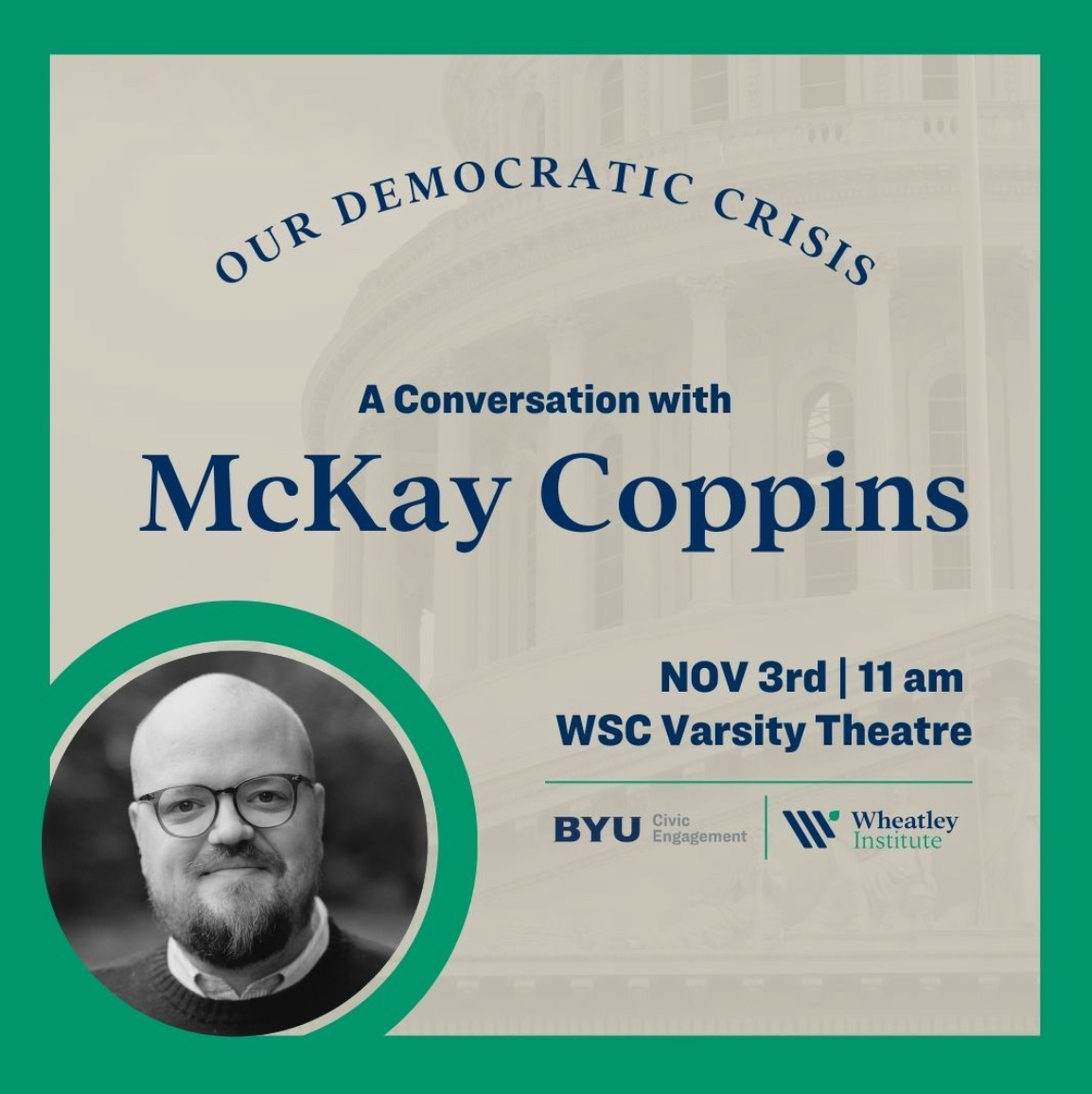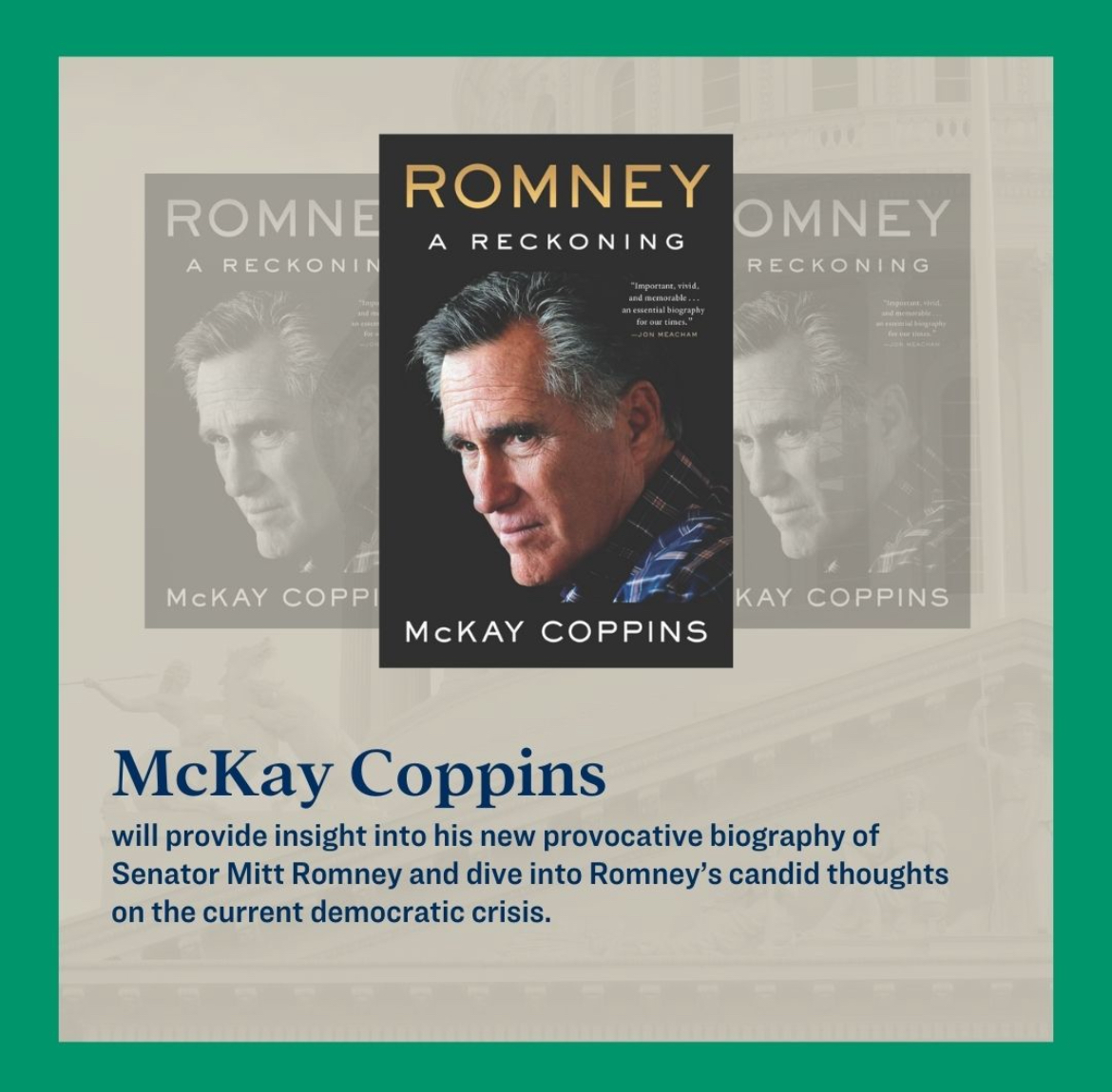The new book “Romney: A Reckoning,” is a brutally honest biography on the life and career of Mitt Romney, the 2012 Republican Presidential nominee and current political pariah of his party.
The book opens in the midst of Romney’s narrow escape from U.S. Capitol rioters on Jan. 6, 2021, while Romney served as a U.S. senator from Utah. From there, the biography backpedals and shows how the American political climate, seen from the eyes of Romney, led up to that defining day.
The author, McKay Coppins, is a BYU alumnus and has been working as a political reporter for over a decade. He said, at a forum at the New York Historical Society Oct. 23, that it was strange to reflect back on the politicians he had been covering and discover what they were really thinking.
In particular, he had done extensive reporting on Mitt Romney during his 2012 presidential election campaign, and Coppins had to reconcile what he observed as a reporter in the moment versus what Romney’s private journals from the time said.
Coppins also explained to Romney that Coppins would hold complete editorial control, and that Romney could not veto any topic of discussion. Romney agreed.
When I asked Coppins how he got Romney to trust him so completely and immediately, he responded with staggering humility. Instead of sharing his methods of interviewing or describing his persuasive abilities, he simply said, “he deserves a lot of credit for being this open with me.”
“It is very rare to have somebody who is still in politics, still in elected office, be as forthcoming and vulnerable as Mitt Romney was with me,” Coppins said.
This appreciation for Romney’s candor is woven throughout the book. Coppins makes Romney our protagonist, and we see the events from his perspective. Both the narrator and main character frequently cut in with thoughtful retrospection, explaining what justified Romney’s motives at the time and how he has come to reevaluate these experiences.
Coppins said he thinks this is what inspired Romney to agree to the biography in the first place. He had started keeping a journal as a possible source for a later autobiography, but Romney eventually decided he could never be impartial about his own life, and he gave up the task to Coppins.
And Coppins honored this objectivity while clearly being grateful for the integrity that made Romney entrust him with his story. He conducted countless interviews in private, and Coppins worked to understand how the events of Romney’s career played out in his personal life. Coppins also took the time to offer differing perspectives when necessary, showing the reader that this was not a love letter to a politician, but a deliberate journalistic narrative.
Throughout the process of interviewing, it became clear to Coppins that the main throughline of the story had to be how Romney was beginning to face the consequences of his actions, this “reckoning” that the title evokes.
Among these tough questions that Romney explored in the process were how the Republican Party changed to allow Donald Trump to be its defining politician, and what role Romney himself had in allowing what he sees as the corruption of his party.
Did he have the same self-serving tendencies that he sees in politicians who enable Trump? Was he too late in condemning the reality star turned president?
Coppins carefully explains these reconciliations, which oftentimes included surprising descriptions of other prominent politicians.
“Romney: A Reckoning,” has received widespread attention throughout the country, with people discussing the characterizations Romney gave about figures like Mitch McConnell, Harry Reid, Jon Huntsman, Jr., and Donald Trump.
“What I love about McKay Coppins’ book is that he tells an important story with courage and he tells the story of character in a man who made difficult decisions and choices that he knew were not popular, but he did it because he believed that they were right,” said Jane Clayson Johnson, another BYU journalism graduate and successful reporter. Johnson and Coppins were invited by the Harvard Book Store and Cambridge Public Library in Boston to discuss the book on Oct. 30.
While Coppins has been met with more positive attention than he could’ve imagined (he told me that he seriously doubted if anyone would ever want to read the book), he has also gotten the backlash one can expect when they write a book that includes descriptions of conversations held behind closed doors.
On his social media app, Truth Social, Trump called the book “crummy,” as well as “boring, horrible, and totally predictable.” This is just one of many harsh criticisms of the biography.
But Coppins is no stranger to controversy.
He told me a story of his time as a student editor of the Daily Universe, which he said prepared him for his career.
One of the other student reporters got a leaked document outlining all of BYUSA’s expenditures for a semester. He said the itemized list of budget expenses included things like one member’s personal laundry bill, among other suspicious charges.
Coppins used this information to help his team write a series of investigative reports about how the BYUSA was spending its money.
“It was… incredibly controversial,” he said.
Some members of BYU’s administration, especially those involved with BYUSA, took issue with these reports, calling them unfair characterizations of the organization. Coppins laughs about this now, but said that at the time, he was really worried about the backlash.
“I kind of learned through that experience how to deal with pressure from powerful people who are mad about stories you’re writing,” he said.
While an article in a student newspaper is much lower stakes than a biography that exposes unflattering details of the nation’s political leaders, Coppins said that was a real test in how to handle backlash from his writing.
Though she wasn’t part of this specific incident, Jane Clayson Johnson agreed that her training at BYU gave her, “a little taste of the real world while I was still in college.”
“Romney: A Reckoning” is the work of a thoughtful political journalist and profiler, and represents an understanding of self-reflection that is often not present in, or at least not acknowledged by, a political figure as prominent as Mitt Romney.
Earlier this week, as Coppins made his way through New York City between media and promotional interviews, he saw an advertisement for his book on a huge electronic billboard in Times Square, and he was struck with a surreal moment he had never expected.
“I don’t even wanna say it’s a dream come true because I would never have dreamed of something like this happening, but it’s just really nice that, you know, people are reading it.”






